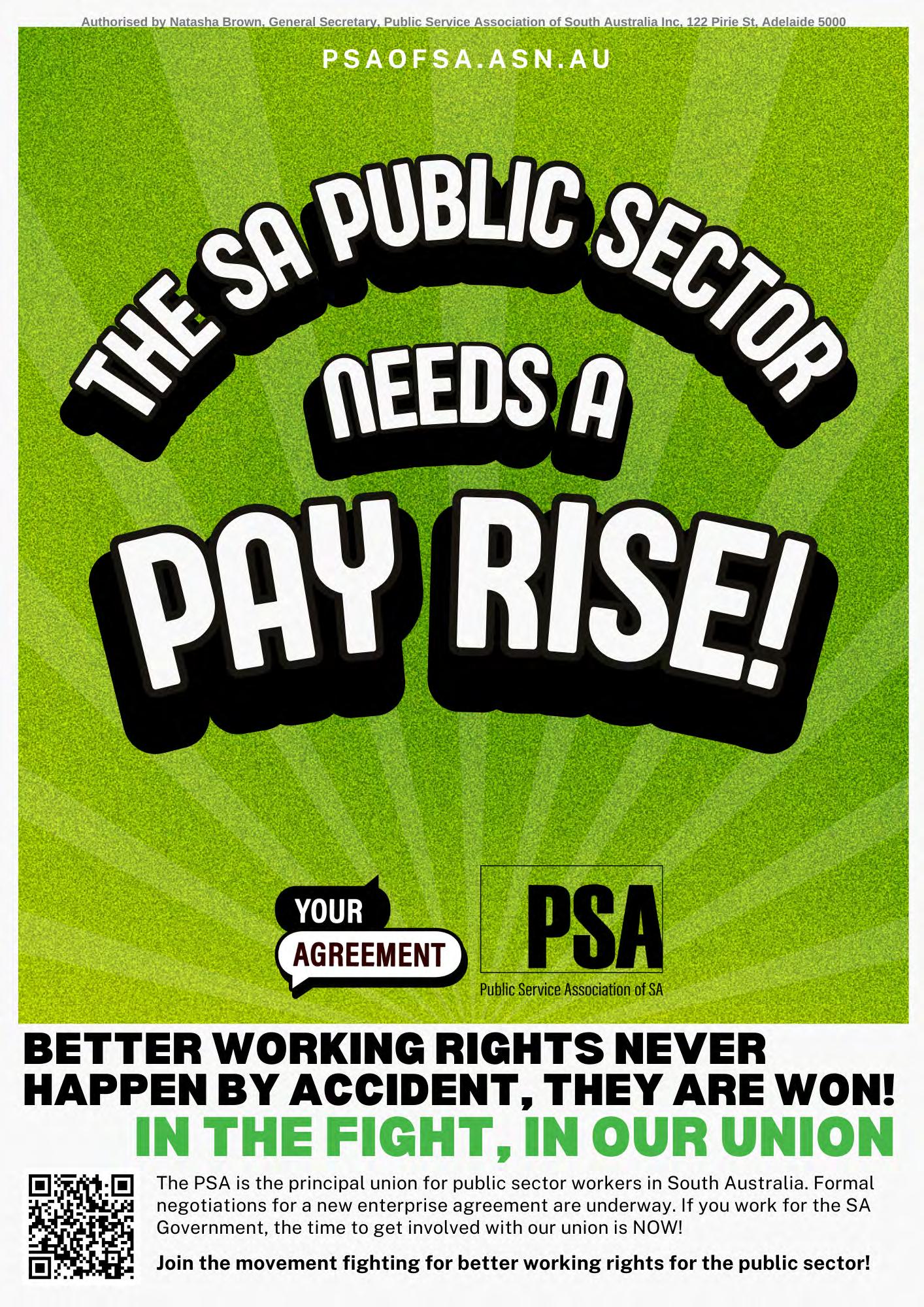












Welcome to the first issue of the Public Sector Review for 2025.
Everything the PSA does is driven by our values – of which solidarity comes first. In this Review, we look at how PSA members at worksites across the state are practicing solidarity as they take collective action in support of our common goals of wage justice, job security, manageable workloads and better conditions.
We also explore the government’s recent announcement of its ‘divide and conquer’ strategy – to negotiate a separate Allied Health Professional (AHP) and Allied Health Assistant (AHA) agreement.
This issue focuses on the great work our members are doing across the
state – including the work of fisheries officers in PIRSA, our Young Members’ Network, two inspiring Worksite Reps and the fantastic member turnout at the International Women’s Day march. We also highlight wins that the PSA has delivered to members – and look at our continuing fight for safer workplaces for Correctional Services members.
We hope you are inspired to join us in taking action for the wage justice and better, fairer conditions for all South Australian public sector workers.
Natasha Brown
Christian Hagivassilis
In January this year, the PSA sent out a member survey about the Review. Almost 1,000 of you responded, with three lucky members randomly selected to each win a $50 Gift Card. Congratulations to those winners! Overall, the feedback was very positive and included some excellent suggestions. We’ll be working on implementing the most common recommendations throughout 2025 – starting from this issue. Thanks to everyone who participated. Your feedback will help us make the Review informative, relevant and appealing to all our members.
WEBSITE
The website has general interest articles, a links page and specific sections for women, schools, higher education and correctional services. www.cpsu-spsf.asn.au
The Public Sector Review is an official publication of the Public Service Association of SA Inc and the Community and Public Sector Union (SPSF Group) SA Branch.
Comments, letters and editorial material to: ‘The Editor’, Public Sector Review Level 5, 122 Pirie Street,
and printed on recycled and sustainably sourced paper by Created 2 Print, 3 Thompson Street, Dry Creek SA 5094. www.created2print.com
The Public Sector Review’s official publication number is PP565001/0010. Volume 9, Number 1. Responsibility for political content in this publication is taken by Natasha Brown. psaofsa.asn.au @PublicServiceAssociationSA @psa_of_sa

Unions are meant to be values-based organisations. The PSA values –solidarity, equality, integrity, respect, fairness, community – are printed on the front page of this magazine for good reason. They’re embedded into all the PSA’s strategic and operational plans, and at the heart of every decision and every action we take – large and small.
Values are important because unions regularly encounter challenging issues. To solve them fairly, our actions and decisions must be values-driven. These shared values are the foundation of our decision making and keep us connected to our purpose: to serve our members’ best interests.
I believe very deeply in these values. They drive me every day in my leadership of this great union – which I’m pleased to say is growing in numbers and in strength.
Our primary purpose as a union is to further the collective interests of our members. In order to do this, it is critical that we listen to members and understand what is important to you.
I am firmly committed to keeping our union focused on what matters to members. In the lead-up to this round of Enterprise Agreement negotiations, we consulted extensively with members through surveys and state-wide membership meetings. The findings of this consultation then formed the basis of the PSA agenda for negotiations – wages, workloads, job protection and better conditions.
Our thorough engagement with our diverse membership gives me great confidence that when we sit at the
by Natasha Brown
negotiation table, we understand our members’ priorities and our entire focus is on achieving an outcome that meets members’ needs.
The work of our Organising team, development of Worksite Representatives and the introduction of our Worksite Representatives Charter have helped us to increase member-led action exponentially over the last couple of years.
The current industrial actions underway – some in worksites that have never taken action before – is testament to this progress.
Working together in a disciplined way to pursue the matters that we know, through our democratic processes, are most important to members, gives us the best chance of success.
To genuinely and faithfully reflect the will of our membership, our union must also be inclusive and representative. The PSA has a very broad and diverse membership – something that makes our union special and is one of our greatest strengths.
As a public sector union, our members support our entire community. Drawing on our diverse experiences, skills and perspectives gives us the strength and depth to best address the issues facing our members, and the communities you serve.
Most importantly, a union must act in its members’ best interests at all times. This is not just a legal or fiduciary duty –it’s the right thing to do.
It is common knowledge that many unions are affiliated to political parties (usually
the ALP). The PSA, however, is proudly unaffiliated. This is especially crucial as a public sector union, since ultimately, the government of the day is also our members’ employer.
As a union, we must be free to criticise the government without fear whenever they act against our members’ best interests. We also must be able to consistently and constantly lobby for our members’ best interests – no matter who we’re talking to. Because we are unaffiliated, we’re free to advocate in any and every way necessary to pursue our members’ interests and priorities.
It is crucial that our union remains free from political influence and free from the risk of being subject to the demands of any political party.
Members’ best interests must be our relentless focus, without any conflict of interest – especially any political allegiance to your employer.
Of course, the government would love to control our union and have compliant public sector representatives. They would also love to use PSA members’ money to support their own political campaigns.
Keeping the PSA proudly independent and unaffiliated is the only way we can preserve the integrity of our union –keeping us focused on, and fearless in, our pursuit of your best interests.
We can – and will – overcome the many challenges in this round of Enterprise Agreement negotiations and achieve PSA members’ goals – by working together and staying true to our values.
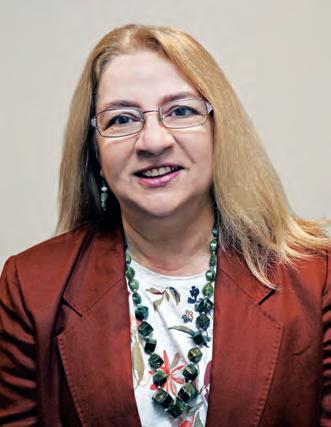
by Lillia Rozaklis
On Saturday, 8 March women around the world celebrated International Women’s Day (IWD). It was inspiring to see PSA members attend the IWD march from Victoria Square / Tarntanyangga and walk together under our PSA banner. It reminded me of the critical role that unions have played in helping champion, advocate for, and be part of many wins for South Australian working women over the years.
The first record of union action in South Australia dates from 1836, when crew members of The Emma – one of the four ships transporting settlers from the UK to Adelaide – threatened to strike over wages (all with the support of the passengers).
This was the start of union action in the state, where, despite efforts by their bosses to outlaw their right to organise, workers united and won better wages and conditions – including the eight-hour day.
But it wasn’t until 1890 that the Working Women’s Trades Union (WWTU), the first South Australian women’s union, was formed. The Union was led by two strong, passionate women – Mary Lee and Augusta Zadow.
Mary Lee devoted much of her life to social justice. She was a key player in changing laws to protect young women from exploitation. A tireless campaigner for the rights of working women, she helped deliver food and clothing to women and families affected during the depression of the 1890s.
Lee also set up the South Australian Women’s Suffrage League with suffragists Mary Colton and Catherine Helen Spence. Then, on Lee’s suggestion, the WWTU was formed and she became its first secretary.
Augusta Zadow was the first treasurer of the WWTU. In 1891, she was chosen as a delegate for the State’s United Trades and Labor Council. Together with Mary Lee and supported by unionist David Charleston, she set up a log of wages for Adelaide. Zadow was also dedicated to helping women secure better wages and health and safety conditions, and putting an end to sweatshops.
Mary Lee and Augusta Zadow began what is now a proud tradition of strong women within the South Australian Union movement. South Australian women were second in the world after New Zealand to win the right to vote. The Trade Union movement was a key supporter of the South Australia’s Women’s Suffrage League who led this fight for 14 years, eventually winning it in December 1894.
“ South Australian union women have also fought to achieve other workplace rights, including paid parental leave and family and domestic violence leave, flexible work rights and a positive duty for employers to prevent sexual harassment in the workplace.”
And while the fight to close the wage gap is far from over, during the past two years the gap has reduced from 14.1% to 11.5% less than the wages of men.
There’s plenty more work to be done – but there’s plenty to celebrate about the strong union women who lead and inspire us.
I would like to celebrate our long-time PSA member and General Secretary, Natasha Brown. Having worked closely with Natasha on the PSA Council for more than a decade now, I’m inspired by her deeply principled outlook and hard work in helping transform the PSA to member-focused engagement – and her commitment to standing up for a strong public sector.
I hope you’ll join me in celebrating the strong union women in your life today.

by Christian Hagivassilis
Hundreds of PSA members are standing united and taking action in support of a new salaried enterprise agreement. Many of these members have never expressed their collective power before. At the same time, our union is growing in a way we haven’t seen in more than 20 years.
As well as the widespread action underway now, here are other recent achievements that members won by uniting:
• Worksite Reps and members at the SA Museum worked with Natasha and me, PSA organisers and the community to save jobs – and to change the direction of the leadership of the Museum.
• PSA members working in SA Water took collective action and achieved a better and fairer deal in their enterprise agreement.
• Members in Red Cross Life Blood took part in cross-border, co-ordinated industrial action to bring the NGO to the negotiation table with a fair offer.
Going back a bit further, our Correctional Officers are practised at organising and leading action in their pursuit of a workplace that respects their role and provides what they need to perform it safely.
These are clear signs that as a union, more power is resting with members on the ground – and that the PSA is continuing to transform into the fighting union we need to be to withstand the challenges ahead.
This has not come about by luck. It’s because as a union, we’re embracing the idea that we are strong when we are united; when we are organising.
There are two broad models describing how unions achieve their goals, help members and make positive change: servicing and organising
Servicing is when the PSA as an organisation does something for members – such as industrial support and representing members in tribunals. It relies on existing industrial instruments like legislation and enterprise agreements – using the law to achieve a benefit for members.
“ Organising is when, as a union, we work toward a common goal as members. At its heart, it’s the idea that the PSA is the membership.”
This involves working together to empower workers, build union structures within worksites, elect and support Worksite Representatives and bring in new members. Through organising, we build our strength and confidence to raise our voices together – to stand together, fight together and win together.
Organising is how the union movement won conditions and influenced laws to improve workers’ rights – from the
eight-hour day, sick leave, workers compensation, better wages and conditions and much more.
Unfortunately, many workers took these conditions for granted and no longer saw the need to be organised or be part of a union, reducing our movement’s size and ultimately our power. This led to the decline of so many unions around the world.
From 2017, we began to move the PSA from a largely servicing model to an organising model. This was part of a deliberate strategy to put the power and ownership back into our members’ hands and prepare for those times when the government takes public sector workers for granted. We established a dedicated Organising Team, increased training and support for Worksite Representatives and put increased focus on union structures within worksites.
During the last three years Natasha and I have accelerated this work. This combined effort is now coming to fruition.
Together, we have shifted the focus to a more organised membership – because history has shown it’s the only way our union can remain strong. We’re getting back to our grassroots and rediscovering the power that our movement came from – using it for the fights of today and readying for the campaigns of tomorrow.
We’re at our most powerful when we all act together. I’m proud to be standing with all of you – as one, united PSA.

• The SA government still refuses to acknowledge the cost-of-living and attraction and retention crises.
• The government’s proposed separate agreement for Allied Health Professionals (AHPs) and Allied Health Assistants (AHAs) strips out critical conditions and includes a pay offer well below member expectations.
• PSA members’ negotiating position is being undermined by other unions and bargaining agents.
• Meanwhile, PSA members across the state are taking authorised actions in support of a fair and respectful outcome.
• The PSA has hard evidence that the government can well afford a decent pay rise for public sector workers.
By refusing to acknowledge that public sector workers are facing cost-of-living and attraction and retention crises – and that your wages are out of balance with other sectors of the labour market – the SA government is denying reality.
In March 2025, the government issued an offer for a separate enterprise agreement for AHPs and AHAs – counter to what the PSA and our AHP and AHA members want. The pay rise offered by the government is well below what PSA members need and expect. Of significant concern, the government’s offer also included proposals to strip out or water down important conditions we’ve all fought long and hard for – including job security, consultation and dispute resolution provisions.
This is a classic ‘divide and conquer’ strategy. Separate agreements weaken workers’ collective power to negotiate.
“The government’s not proposing a separate Allied Health agreement because it’s better for workers – they’re doing it because they’re being cheap,” said PSA General Secretary, Natasha Brown.
“They have proposed an offer to AHPs and AHAs of three pay increases of 3 per cent and one of 2.5 per cent, over four years. This is insulting and completely inadequate for our members, whose purchasing power has already fallen around 10 per cent behind where they were pre-COVID.”
In February this year, the government notified the PSA that it intended to negotiate for a separate EA for AHPs and AHAs. The PSA’s strong position is for a single salaried agreement.
The PSA advocates and negotiates for all PSA AHP and AHA members – and will continue to do so, regardless of the government’s proposal.
The government’s proposal for a separate agreement is:
• Divisive: Splitting off groups from the salaried agreement would make those separated groups isolated, and therefore more vulnerable.
• Undermining: The HSU, and two bargaining agents (Charlotte Watson and Celia Brougham) are supporting the government’s proposal for a separate agreement for AHPs and AHAs. They are undermining PSA members’ position in these negotiations. In communications sent to members in February 2025, the HSU stated: “It is highly likely we will need to make sacrifices on certain claims to achieve an EA that is separate for Allied Health with specialised terms…” In other words, they are ready and willing to trade off conditions – and pay – to achieve a separate agreement.
• Political: The controversial HSU is affiliated with the Labor Party, joining its dominant right faction last year, while the bargaining agents have links to the ALP, as well as working in government IR representing the employer.
“To negotiate hard for our members’ priorities – better pay, job protection, reasonable workloads and better work conditions – we must be able to stand up to government. That’s why independence from government, and non-affiliation with any party, is so important,” said Natasha Brown, PSA General Secretary.
“Decades of experience negotiating for public sector members has taught the PSA that united collective action gets the best results for members”.
In response to the government’s refusal to negotiate in good faith, and in support of a fair and respectful agreement, PSA members across the state have started taking PSA-authorised action at their worksites.
Members in worksites across Health, Child Protection, Human Services, Department of Environment and Water, the Public Trustee and more have voted to take collective action to push the SA government to acknowledge the cost-ofliving and attraction and retention crises –and then take steps to fix them.
At the time the Review goes to print, the actions currently being undertaken
The PSA has emphasised members’ priorities for a new agreement to the government many times.
In short, these are:
• a single agreement which covers all those employees covered by the current salaried agreement – not the divisive, separate insulting John Howard style Work Choices agreements now being proposed by the government.
• retaining or improving all existing conditions
• a significant wages package which restores the value of public sector wages eroded since the pandemic, and which brings South Australia’s public sector wages back into balance with other public sectors, other states, and the private sector. Not the insulting 3 per cent and 2.5 per cent increases the government is proposing.
• Improvements to wages and conditions which deal with:
• the cost of living crisis
• the attraction and retention crisis
• current labour market pressures
• improved classification and progression pathways
• equity with other workers
• recognition of skills and experience
are mostly administrative and financial in nature. They are designed to disrupt and frustrate the employer without adversely impacting on the South Australian public or provision of public services. These actions have included members refusing to:
• collect statistics
• fill in vehicle log books
• take on extra files
• attend certain work meetings
• participate in certain training
• authorise certain invoices
• respond to reporting or data requests from departmental executives
• prepare reporting for government Ministers
• reducing the gender pay gap
• workloads
• vacancy management
• shift issues including penalty rates, rostering issues and leave
• maintaining and recognition of professional qualifications
The priorities listed above are affecting different groups of members in different ways but are common across the public service. Resolving these priorities may vary according to the group. The PSA has put more detailed and specific proposals to government with this in mind.
Members are also taking part in visibility and solidarity actions, putting campaign materials such as ‘SA public sector needs a pay rise’ posters on government cars and in other public-facing places.
PSA Organisers are currently working with PSA Worksite Representatives and members across the public sector to undertake actions. If your worksite has not yet commenced action, contact your PSA Organiser to learn more.
These priorities apply across the whole public sector. That is why the PSA is advocating for a public sector wide approach – not the current limited, divisive and inequitable approach of the government.
The PSA will continue to advocate relentlessly for real pay increases that address current cost of living pressures; labour market realities; attraction and retention; and protection against future inflation, all of which are affecting members across our entire membership.
Be informed: Read the PSA Information Updates, social media posts and other information about the EA. Attend PSA meetings at your workplace or online.
Be visible: Wear a PSA lanyard, or put a PSA cup on your desk. Put posters up on your noticeboard. Take this magazine to work and leave it in the lunchroom.
Be vocal: Talk to your colleagues about what PSA members want – and what they’re doing about it.
Be active: the union is its members –we’re as powerful as you are! By joining with other members in solidarity to take action, you’re sending a strong message to government that you demand wage justice and better conditions.
If you’re a PSA member and you want to take action at your workplace, talk to your PSA Organiser or PSA Worksite Rep today.
If you’re not a PSA member, join today so you can take action and be supported by your union, the PSA.
We all know the cost-of-living crisis is hitting members hard. We’ve heard stories from members who are struggling to pay the mortgage, choosing between food or medical bills, selling their clothes or moving back in with their parents because they can’t afford rent.
Now, we have the data to support these stories – and to prove that the government has the capacity for a decent pay rise.
In late 2024, the PSA released a report we commissioned from the Centre for Future Work at the Australia Institute, Economic Prosperity, Public Sector Restraint. It makes a powerful, evidencebased argument that South Australian public sector workers need a pay rise. The report found that:
• By 2024, the real purchasing power of South Australia’s public sectors wages had fallen by up to 10% compared to pre-pandemic levels.
• From 2018-19 to 2023-24, the South Australian economy grew cumulatively by almost 15% – faster than any other state.
• The South Australian economy is stable and diverse – so the government can well afford a decent pay rise for public sector workers.
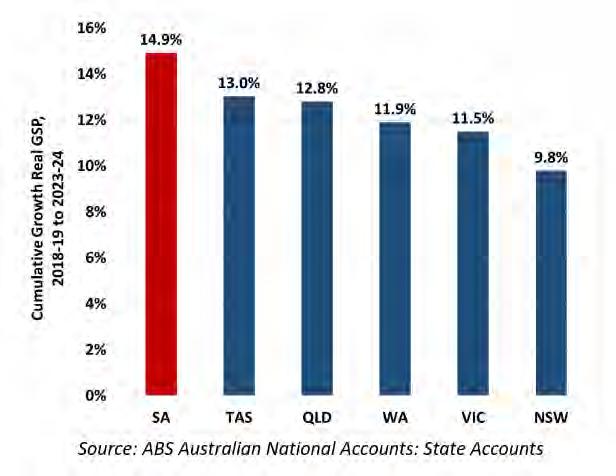
In January 2025, Commsec’s State of the States reported that SA’s economy is equal second with Queensland (just behind WA) – and leads the nation on real economic growth.
The government champions this good news at every opportunity – but cries poor when asked to pay the hard-working public sector wages that would keep up with the cost of living.
The PSA recognises that young people bear the brunt of Australia’s current cost-of-living and housing crises. This makes our mission to fight for equity, better pay and improved working conditions more crucial than ever –especially for our young members.
The PSA Young Members Network strives to bring together young workers across the state’s public sector to build solidarity. It aims to help young members to create strength in unity – giving them the opportunity to connect, learn and become empowered through collective action and community.
2025 agenda
The Young Members Network held its first meeting for 2025 in February. The meeting was well attended, with participants keen to focus on learning about union activism and workplace issues. In particular, members want to build skills and knowledge in:
• workplace rights
• mobilising and organising
• current industrial matters, and
• having union conversations.
Cumulative real Gross State Product (GSP) per capita growth by state, 2018-19 to 2023-24 from the Economic Prosperity, Public Sector Restraint report.
Industrial action means partly or completely withdrawing labour – from refusing to do some of your duties, right up to completely withholding all your labour (in other words, going on strike).
Find out more
Log into psaofsa.asn.au and read our Authorised Industrial Action –Frequently Asked Questions.

The Young Members Network will offer a mix of face-to-face and online meetings, making it accessible to young members right across the state. There’ll also be chances to socialise and network at faceto-face events.
The PSA Young Members Network is open to all PSA members aged 35 or under. To find out more or join us, go to psaofsa.asn.au/campaigns/psa-youngmembers-network
The PSA covers a range of public sector agencies and departments across the state. This issue of the Review focuses on the work of our PSA Fisheries Officers.
Primary industries are at the heart of our South Australian communities, bringing in almost $18.5 billion to the state and employing about 78,000 people in 2022–23 alone.
PSA members at Primary Industries and Regions SA (PIRSA) play a vital role in protecting the livelihoods of South Australian communities. This includes our Fisheries Officers, who educate and inform recreational and commercial fishers, as well as patrolling waters and inspecting vessels to enforce regulations.
The work of PIRSA’s Fisheries Officers helps ensure the fishing and aquaculture industry is sustainable. For instance, Officers recently intercepted a man who was illegally fishing for snapper in Port Lincoln, where it is banned until June 2026 so that stocks of the popular fish can rebuild.
A sought-after delicacy found in South Australian waters is abalone. Fisheries Officers protect the abalone industry by checking that licensed divers stick to catch limits, and intercepting people who dive for or traffick abalone.
Since 2024, Officers have also worked to protect abalone from abalone viral ganglioneuritis (AVG), which was detected in abalone found near Port McDonnell.
The virus, which is fatal to abalone, was initially contained through stringent biosecurity practices. However, its highly contagious nature meant that AVG spread quickly, killing more than 80% of abalone within the Southern Zone.

After consulting with RecFish SA and the abalone industry, PIRSA closed abalone fishing from the River Murray Mouth to the Victorian Border for at least a year. The closure will give abalone stocks the chance to recover, protecting the longterm viability of the industry.
Our Fisheries Officers are essential to the prosperity and wellbeing of their communities. So it’s astounding to hear that in our neighbouring state, the
Victorian Fisheries Authority has put forward a plan to significantly slash the number of Fisheries Officers there to cut government spending.
The proposal has drawn strong criticism about the impact this move would have on the environment and the fishing and aquaculture industry.
The PSA opposes such short-sighted cost-cutting measures and consistently advocates for a fully funded and resourced public service.
1. What year was the first WOMADelaide festival held? a.1992 b.1993 c.1995
2. Who is considered the founder of modern computer science?
3. If an animal is crepuscular, it is: a. covered with a shell b. infected with rabies c. active at dawn and dusk
4. What song contains these lyrics: ‘Heathcliff, it’s me, I’m Cathy, I’ve come home?’ (Bonus point for naming the artist.)
5. What year did South Australian women first get the vote? a.1888 b.1894 c.1901
6. What are the four ingredients in a Cosmopolitan cocktail?
7. Who won the 2024 AFL Men’s Grand Final?
8. Who is the Prime Minister of India?
9. On a boat, what is the opposite to port?
10. What is the smallest planet in the solar system?
11. What are the colours of the French flag?
12. Which iconic green-loving pop star invented ‘Brat Summer’?
Mon 7 World Health Day
Fri 11 Lunch ‘N’ Learn – Transition to retirement
Wed 9 - Thur 17 SA Youth Week
Fri 18, Mon 21
Friday, Easter Monday
who.int/campaigns/world-health-day
Held at 122 Pirie St or on Zoom. Log in to the PSA website for more details.
Go to dhs.sa.gov.au for more
Public holiday Fri 25
Mon 28
Day
International Workers Memorial Day World Day for Safety and Health at Work
Sat 3 May Day March and family fun day
Mon 5-Fri 9 Anna Stewart Memorial Project – Week 1
Sat 17
Sun 18
Public holiday
actu.org.au/event/international-workers-memorial-day/
Start Tarntanyangga/ Victoria Square and end at Torrens Parade Grounds
On-the-job training course for women and non-binary unionists at SA Unions
IDAHOBIT Day – International Day Against Homophobia, Biphobia, Interphobia and Transphobia idahobit.org.au
Museum Day
imd.icom.museum
Mon 19-Sun 25 National Volunteer Week volunteeringaustralia.org/get-involved/nvw/
Wed 21 Wear Orange Wednesday (WOW)
Fri 30 Lunch ‘N’ Learn – Super money makeover for women
Show your appreciation of State Emergency Services (SES)
Held at 122 Pirie St or on Zoom. Log in to the PSA website for more details.
3 June
23 June UN Public Service Day un.org/en/observances/public-service-day
Wed 25-Fri 27 Anna Stewart Memorial Project – Week 2
Fri 27
Lunch ‘N’ Learn – Starting an income stream
On-the-job training course for women and non-binary unionists at SA Unions
Held at 122 Pirie St or on Zoom Log in to the PSA website for more details.
A PSA member since 2010 and a current PSA Branch Councillor, Mark says he was a ‘pseudo rep’ until 2016 during a restructure at the Museum, when he took on the role officially.
“The restructure didn’t affect me but it impacted other staff,” he said. “It dawned on me how much I cared about my colleagues and what was happening to them.”
Then in December 2023, staff at the Museum were given the details of another restructuring proposal – the notorious Reimagining the Museum. Staff were stunned by the lack of consultation, especially with First Nations people.
In February 2024, there was more bad news: under the new structure, 22 of the 27 affected Museum staff would lose their positions. Members decided to fight it.
Mark worked closely with PSA officials, organisers and industrial officers, who scrutinised the details of the campaign and helped staff strategise successfully.
“With a campaign, you can get caught up in wanting everything now,” said Mark. “The union were really important in helping us know what to do – and when to do it.”
Mark acted as a conduit between the main stakeholders: staff, the PSA, the donors, universities, professional associations and the general public. They were all

pivotal in helping organise actions, which included going before the South Australian Employment Tribunal (SAET), holding a rally at Parliament House steps and signing and delivering a petition to the Premier.
On the back of sustained pressure, the Premier initiated a review and the Reimagining proposal was scrapped.
For Mark, the key ingredient to the campaign’s success was action.
“You can’t complain about something if you’re not prepared to do anything about it,” he said. “If you want things to be different, lead by example and get involved.”
Occupational Therapist Renee Edwards has been a PSA Worksite Rep for more than 15 years. She was attracted to the position because she wanted staff within the AHP and AHA group to have the power to help shape their workplace and profession.
Renee is also a PSA Branch Councillor, actively involved in leading the union’s position on major issues such as our EA negotiation. Over the years, she’s been a strong voice for AHPs – both as part of the PSA’s leadership and at her workplace. So when the SA government came back with its insulting initial proposal in the current Enterprise Agreement negotiations, she was ready to act.
Renee and PSA members at her workplace met with their PSA Organiser. As a collective, they discussed a range of options to show that they were serious
about getting a decent pay rise and better, fairer conditions.
Renee said that members were keen to choose actions that would not impact their clients, but would make things harder for management. Their initial action was to refuse to fill in their vehicle log books – a move that creates administrative drama.
“This action hasn’t affected clients, but it has caused frustration among administration, which was flowing up to management,” said Renee. “This is exactly the effect we wanted to have.”
This is just the beginning, with members at Renee’s workplace preparing to escalate action further.
“We’re meeting next week with our Organiser,” she said. “We’re ready to go to the next level of our plan.”
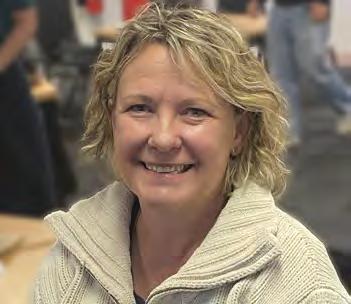
Renee said that as a Worksite Rep, she’s learned the importance of meeting regularly to keep communication clear.
“It’s also critical to work out what your priorities are, and to make a plan and follow it,” she said. “There really is strength in numbers. One person alone can’t do much – but standing together as a group can make a huge difference.”
In a win for Department for Child Protection (DCP) staff, Local Workload Consultative Forums (LWCFs) are being set up to help address unsustainable workloads across the department. LWCFs were won by the PSA in the 2018 Enterprise Agreement as a way to deal with excessive workloads through consultation, whenever possible.
In these forums, management will consult with staff on workload issues, and provide recommendations to make workload management more effective.
After meeting with PSA Organisers, front-line DCP members staged a coordinated ‘walk-out’ in their own time,

to bring attention to their unmanageable workloads. DCP members then drafted a petition to management, calling for action regarding workloads.
The petition attracted 600 signatures –a clear indication that workloads are a department-wide issue.
The PSA then wrote to the department, presenting the petition formally to DCP. In its response to the PSA, DCP expressed its willingness to set up LWCFs with representatives from management, people and culture, the PSA and key PSA Worksite Representatives.
“By taking collective action on their unsustainable workloads in conjunction
The PSA has helped a number of Allied Health Professional members get reimbursed for their professional development workshop registration fees.
with their PSA Organisers, DCP members have had an important win,” said PSA General Secretary Natasha Brown.
“These members support children, young people and families through extremely traumatic and difficult times – and addressing workloads is a important step in helping them avoid burn out.”
DCP regions are in the process of setting up LWCFs in each region. Workloads in Residential Care will also be a standing item on DCP’s Out of Home Care Consultative Forum – which means it will be addressed at every consultative forum.

In one example, the member used her own credit card to pay for the registration fees. Because the credit card was attached to a business account in the member’s name, the employer argued that it did not meet its internal policies. In another instance, a member’s application for reimbursement was rejected because she had used a credit card with Frequent Flyer benefits attached.
However, our members’ enterprise agreement, The South Australian Public Sector Enterprise Agreement: Salaried 2021 does not cite these as valid reasons to not reimburse a member.
Clauses 21 and 22 of the agreement, negotiated by the PSA, which deal with reimbursement of professional development costs for Allied Health Professionals, do not exclude members using a credit card that is connected to a business account in their name or who use ‘rewards’ credit cards.
The members’ PSA Organiser connected them with the PSA Industrial Team, who advocated on our members’ behalf with the employer – arguing that it is a legally established industrial principle that a policy cannot over-ride an enterprise agreement. As a result, the members received full reimbursement of their out-of-pocket expenses.
Following the PSA’s advocacy on these matters, the Professional Development Reimbursement Scheme has changed its policy to allow applications in these circumstances to be approved.
If you’re a member: talk to your Worksite Representative contact your PSA Organiser, or call the Members’ Rights Hotline on (08) 8205 3227.
If you’re not a member: Join today.
March was a horror month for our Correctional Officer members, with four serious assaults involving weapons within a week at Yatala – resulting in prisoners being hospitalised.
Shocking levels of violence in our prisons highlight the danger of critical posts being left unfilled, leaving Correctional Officer members with unnecessary psychological scars to live with.
These four serious prisoner-on-prisoner assaults at the Yatala Labour Prison are more evidence of a failure in safety in the state’s prisons. They’re the result of the Department for Correctional Service’s (DCS’s) determination to run things from head office based on dollars, instead of acting on safety and security advice from Correctional Officers who work inside the walls and know what’s needed.
Staffing issues stem from the Marshall Government’s 2019 job-cutting program (‘Benchmarking’) in South Australian prisons – something the Malinauskas government has not rectified despite continual calls to do so from the PSA and our Correctional Officer members.
“Since 2019, when the department put cost-cutting ahead of the safety of PSA members, drugs in prisons have been on the rise and assaults have increased about a two and a half times over,” PSA General Secretary Natasha Brown told the media.
Unfilled critical posts mean there are not enough officers to carry out adequate searches for contraband including drugs, weapons and mobile phones, or to ensure prisoners can attend work and rehabilitation programs.
“Prisons are risky environments at the best of times, but running them without the required critical posts makes the job downright dangerous,” Natasha Brown said.
“This isn’t just a problem at Yatala either –it’s a systemic issue in South Australia that needs a system-wide solution.”
PSA General Secretary Natasha Brown demanded a meeting with the DCS Chief Executive immediately following the recent assaults. Subsequently, Natasha, PSA Worksite Representatives and PSA staff met with DCS Chief Executive
David Brown and other DCS executives about reducing the risks from the escalating serious assaults in prisons.
While DCS committed to further safety measures during the meeting, the Chief Executive’s position on restoring critical posts remains unchanged. He prefers this staffing issue to be dealt with through an ongoing dispute process currently before the South Australian Employment Tribunal (SAET).
The PSA General Secretary, PSA staff and Correctional Officer representatives also met with the Minister for Emergency Services and Correctional Services, Emily Bourke. The PSA provided the Minister with a copy of our Safer Prisons Model document, and emphasised with her that the government must urgently review the consequences of Benchmarking and restore safety and good order to our prisons.
Natasha Brown told the Minister and the media that DCS must reinstate critical posts on the job floor to curb the rising number of assaults in our prisons.

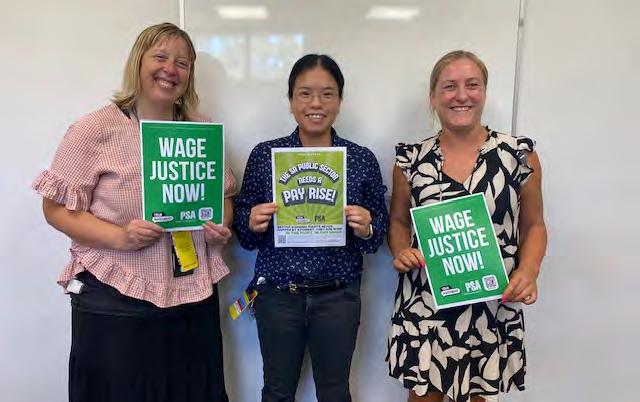
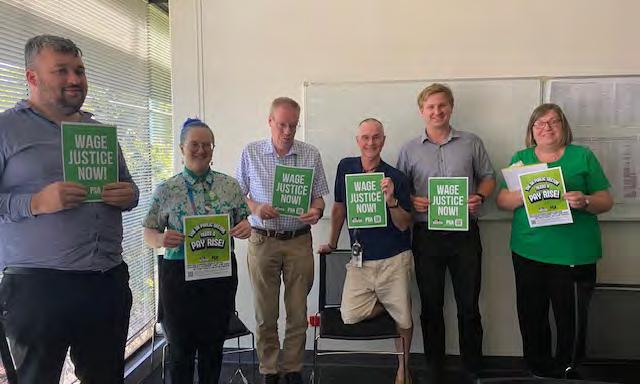
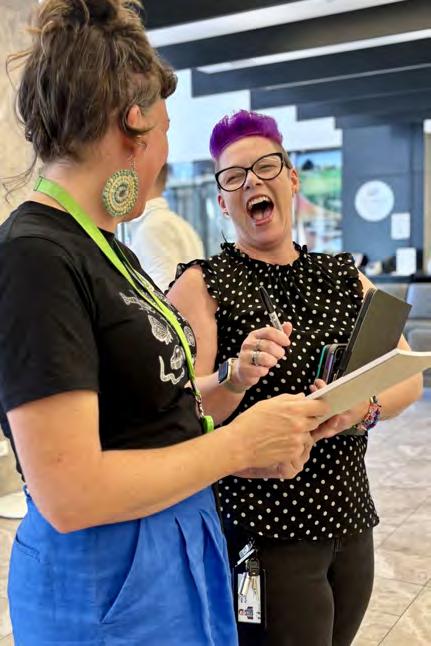
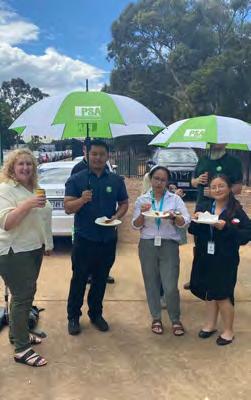

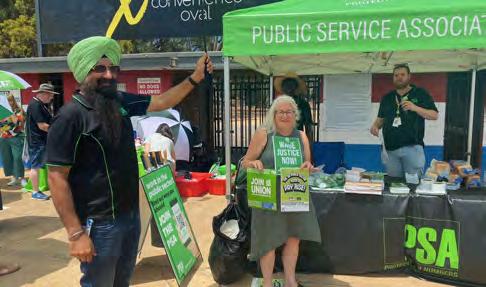
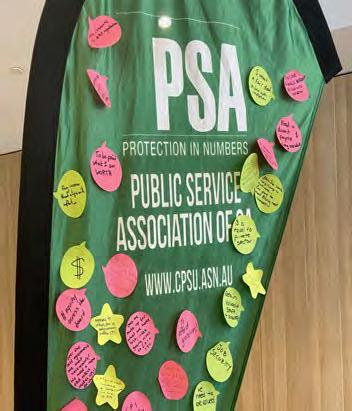

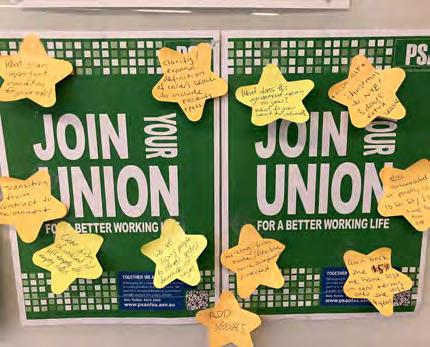

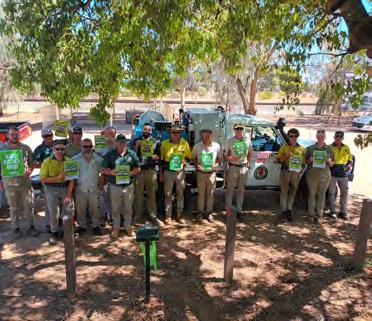
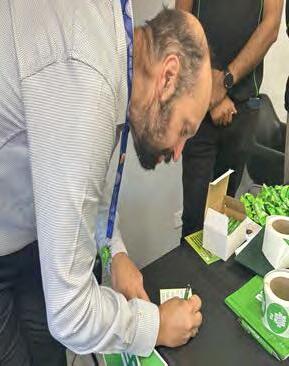
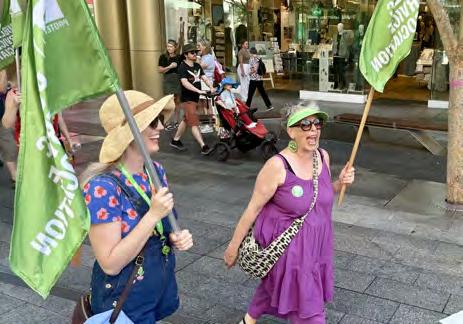
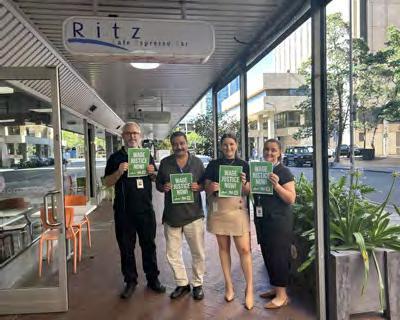
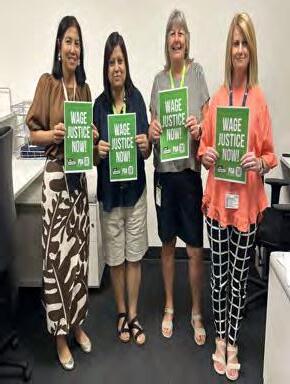

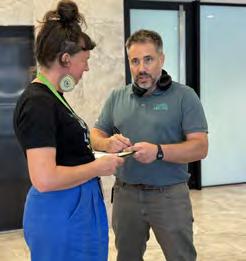

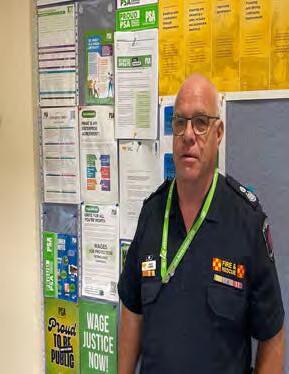
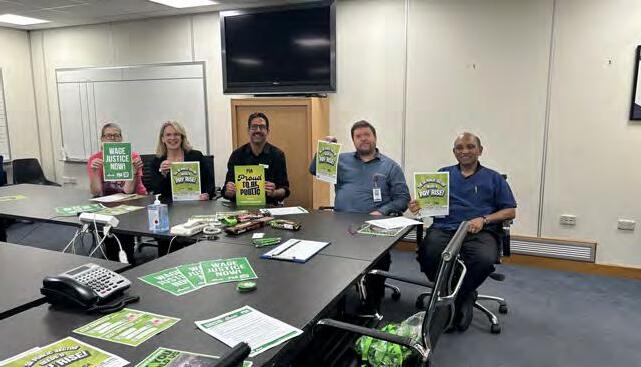
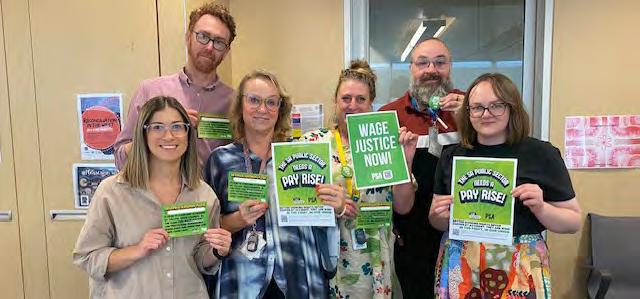
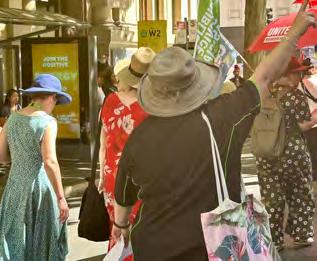
Make sure you’re getting the payments you’re entitled to.
If you are required to work more than eight hours in one day or 38 hours in one week, or when your manager has directed you to do so, you’re entitled to receive overtime.
If you work these extra hours on a weekday, you’re entitled to time and a half for the first three hours, and then double time for any hours after that.
Make sure that if you are required to work weekends or nights that you’re getting the appropriate overtime rates for those times.
Flexitime is an agreed arrangement of working time between an employee and employer. It lets you, as an employee, negotiate your hours of work within agreed limits and conditions.
Your manager can’t direct you to work flexitime. If they ask you to work extra hours, that is overtime. You can choose to be paid or take Time Off In Lieu of overtime (TOIL).
TOIL is when you choose to take the time you’ve worked overtime as time off, instead of as an overtime payment.
It’s entirely up to you if you want to take TOIL instead of being paid for working overtime. In other words, your manager can’t direct you to take any extra hours you work as TOIL instead of overtime payments.
TOIL is taken on an hour-for-hour basis, and paid at the normal rate of pay. You can choose to take TOIL at a later date if you want to.
Typically, if you’re a public sector employee, your salary rises incrementally each year, until you reach the top tier for your classification level.

For example, if you’re an ASO4 who started at level 1 ($76,561 per annum) your salary should increase incrementally each year until you reach level 4 ($80,256 per annum).
Your employer needs to inform you in writing three months in advance if you are going to be assessed for incremental progression before moving up a level.
If you’re assessed as not being ready to progress to the next level, you have the right to be assessed again – at least one month before you’re due to advance to the next level.
See clauses 7.6 – 7.15 in the South Australian Public Sector Enterprise Agreement: Salaried 2021 to find out more.
Are you part of a profession where you must undergo regular professional development? Are you planning to attend a course, conference or seminar for professional development that’s related to your work – and pay for it out of your own pocket?
Check with your employer first, as if it’s part of your essential professional development required for you to do your job, you should be entitled to be reimbursed. You’ll need to provide the details of the event or study, and show how it is relevant to your work.
See clauses 21 and 22 in the South Australian Public Sector Enterprise Agreement: Salaried 202 to find out more.
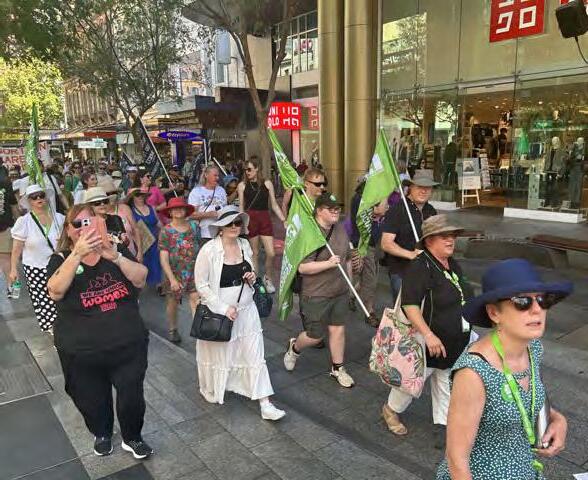
The march began at Tarntanyangga (Victoria Square), where the crowd was inspired by speakers who shared their experience of empowerment as union members, and railed against public service cuts that have recently infiltrated Australia’s political discourse.
After the speeches, the march began. As the PSA contingent made our way through Rundle Mall, we were thrilled at the interest from the general public, many of whom showed their support for our Enterprise Agreement negotiations by taking and wearing our PSA Wage Justice Now stickers.
The march finished at Mukata (Hindmarsh Square) where the crowd sang a rousing
It was a scorching hot Saturday in the middle of Adelaide’s mad March season. But nothing could deter PSA members and organisers from marching together for International Women’s Day (IWD) to celebrate the inspiration, power and achievements of women unionists past and present.
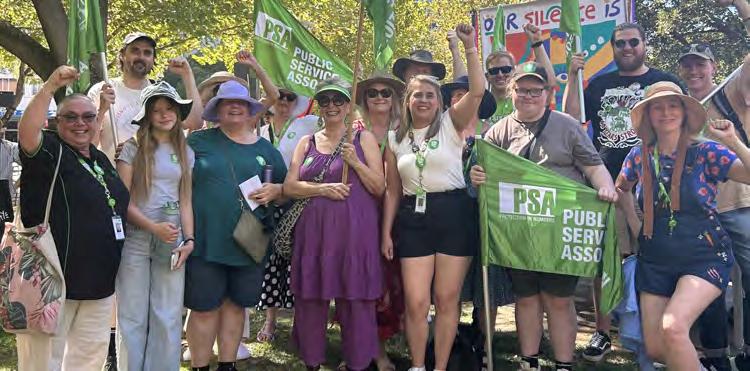
version of the iconic suffragist song Bread and Roses. The mood was celebratory and inclusive, with most unions well represented.
A special thank you to members from the PSA Women’s Network and other members who helped make the day so special.
Whether you are enjoying retired life, crunching the numbers for your upcoming retirement or still a a long way off from leaving the workforce, you may be interested in PS Superannuants.
Established in 1927 and run by volunteers, PS Superannuants provides representation and advocacy for members of the South Australian and Commonwealth governments’ superannuation schemes.
PS Superannuants aims to:
• keep its members informed regarding superannuation and related financial matters
• watch over its members’ welfare regarding their superannuation
• represent its members’ interests directly to government and through various affiliations and consultative forums
• help its members connect through regular meetings in Adelaide and Melbourne to catch up on relevant issues and hear a range of guest speakers.
Go to pssuperannuants.org.au if you would like to learn more.
Union Aid Abroad APHEDA

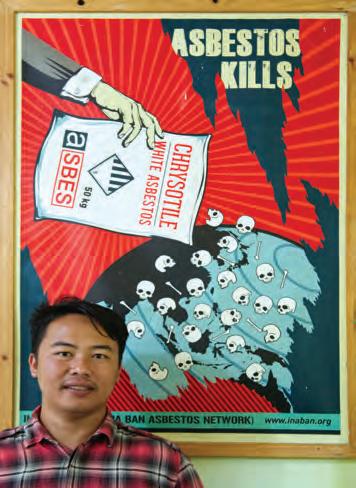
Asbestos manufacturers in Indonesia sued asbestos-ban campaigners for massive damages simply because they wanted workers to know the deadly consequences of asbestos. However, the court ruled against them.
In 2003, Australia banned asbestos, and in 2007, Australian workers secured a hard-fought victory for victims. Unions and asbestos survivors pressured the notorious James Hardie company into agreeing to a $4 billion compensation deal for its former employees suffering from diseases like mesothelioma and lung cancer.
Now, Indonesia is having the same fight. Last year, the consumer group Yasa Nata Budi Institute for Consumer Protection (LPKSM) and activists of the Indonesian Ban Asbestos Network (INABAN) won a landmark case in the Indonesian Supreme Court, securing a ruling that requires all asbestos products to carry health warning labels.
Outrageously, the Fiber Cement Manufacturing Association (FICMA) sued these campaigners, demanding 7.9 billion rupiah ($750K AUD) in compensation every month.
But activists have won once again.
The Central Jakarta District Court recently threw out the lawsuit filed by FICMA against public health activists.
LPKSM coordinator Leo Yoga Pranata stated this victory ensures Indonesian workers and their communities can access products with clear, complete, and understandable information – essential for assessing health risks independently.
“We are very happy with this verdict. It reinforces that asbestos-based roofing must include a label warning of the health dangers of these products. This is clearly a public victory over the profits made by the asbestos industry,” he said.
Despite the victory, activists expect FICMA to appeal the decision or continue its legal battle.
The coordinator of the movement to ban asbestos in Indonesia (INABAN), Moh Darisman, explained that the Central Jakarta District Court’s decision reflects the Indonesian government’s commitment to protecting the community from diseases caused by asbestos.
“The lawsuit by LPKSM Yasa Nata Budi (to the Supreme Court last year) is appropriate and proper. Together with various institutions and experts that make up the INABAN network, we will continue to monitor and work hard to protect the rights of citizens to live without the threat of asbestos-related diseases,” he said.
LION Indonesia Executive Director Surya Ferdian responded to the victory by stating, “The move to label asbestosbased roofing products is a moderate step that has also taken into account the interests of employers and workers. The labelling of dangerous products and provision of health protection warnings is a reminder of the company’s responsibility mandated by the constitution.”
“As the World Health Organisation clearly advises, there is no safe level of exposure to asbestos fibre. We urge all manufacturers to transition their production lines out of asbestos and to use safer alternatives that are available.”
LION Indonesia, a Union Aid Abroad–APHEDA partner organisation that has been advocating for the elimination of asbestos hazards since 2010, will continue pushing for Indonesia to escape the trap of economic and health losses caused by asbestos use.
“We have seen many examples of countries that were ultimately forced to cover the health insurance costs of their citizens due to the high number of diseases caused by asbestos. Indonesia must not experience the same fate,” he said.
Australian unions and activists have long supported the campaign to eradicate asbestos-related diseases in Southeast Asia. Your international solidarity is building a strong global movement! If you haven’t already, now is the perfect time to become a member of Union Aid Abroad–APHEDA, the Australian union movement’s organisation for global solidarity. Join at






Everyone’s retirement looks di erent. As the cost of living continues to rise, so does the cost of having a comfortable retirement and the nancial freedom you need to enjoy that retirement.
Achieving this goal might seem challenging, but it’s certainly not impossible. Super SA has some steps to help realise your retirement goals.
You can utilise our ‘Hitting the Target’ tool, available on our website, to see guides on how much money is recommended to have the lifestyle you want
in retirement, helping you to understand whether you’re on track to have that amount.
Also available on our website is the ‘MoneyFit Health Check’ tool. You can use this to learn about your budgeting, debt management, and savings habits. This will assist you in addressing which areas can be improved as you plan your retirement journey.
Super SA also o ers educational sessions to learn more about super, including how making extra contributions and switching investment options may boost your balance.
For a full list of sessions, visit the webinars and seminars section on our website.
Finally, we recommend you speak with a licensed nancial planner, who will review your situation, help determine your goals, and develop a plan to help you achieve them.
Don’t let the rising cost of living stand in the way of the retirement you’ve worked hard for. By taking small steps now, you can live your best life in retirement, and we’re here to help you get there.

Salary sacri cing what you can a ord to live without now can set Triple S members up to live larger in retirement.
With no annual cap1 on salary sacri ce contributions and no annual fee to set up, you can save now and spend later.
Visit supersa.sa.gov.au to learn more about Triple S and salary sacri cing with Super SA.

Since we spend such a large portion of our lives working, our feelings about our job can impact our overall health and wellbeing. Learn how to maintain a positive mindset at work this year with tips from psychologist Sarah Davies.
1. Understand what drives your happiness
The first step to feeling happier at work is understanding what makes you happy. Happiness isn’t one-size-fits-all; it’s unique to each individual. Reflect on what activities or aspects of your job bring you joy. Once identified, integrate these into your daily routine as much as possible.
2. Adopt a growth mindset
A growth mindset, the belief that abilities can be developed through effort, can significantly enhance job satisfaction. Embrace challenges as opportunities for learning and focus on personal development rather than perfection. This approach helps you find joy in the process, even during tough times.
3. Set realistic goals and celebrate achievements
Clear, achievable goals provide direction and purpose. Break larger tasks into manageable steps and celebrate your progress, no matter how small. Recognising your successes boosts your mood and keeps you motivated.
By Sarah Davies, Registered Psychologist
4. Build positive relationships
Positive relationships at work play a major role in happiness. Engage in open communication, offer help, and be willing to receive it. A supportive and respectful work environment can make even the most challenging days more enjoyable.
If you’re struggling with conflict or difficult relationships, consider seeking guidance from a trusted mentor or professional to help navigate these challenges constructively. Addressing challenges head-on can foster better understanding and lead to a more harmonious work environment, as opposed to ignoring and suffering in silence.
5. Prioritise work-life balance
Maintaining a healthy work-life balance is key to happiness. Overworking leads to burnout and stress. Set boundaries between work and personal life, take regular breaks, and engage in activities outside of work that bring you joy.
6. Practice gratitude
Gratitude can shift your perspective from what’s wrong to what’s right. Keep a gratitude journal to note positive experiences or aspects of your workday. This practice cultivates a positive mindset, making you more resilient to stress.
Full article at healthpartners.com.au

Disclaimer: The information contained here is of a general nature and does not take into account your personal medical situation. The information is not a substitute for independent professional medical advice and is not intended to diagnose, treat, cure or prevent any disease or be used for therapeutic purposes. Should you require specific medical information, please seek advice from your healthcare practitioner. Health Partners does not accept any liability for any injury, loss or damage incurred by use of or reliance on the information provided. While we have prepared the information carefully, we can’t guarantee that it is accurate, complete or up-to-date. And while we may mention goods or services provided by others, we aren’t specifically endorsing them and can’t accept responsibility for them.


Buying a house is a huge financial decision – so make sure you know your legal rights before starting the buying process.
Check your contract, especially for:
1. A ‘subject to finance’ clause if you’re getting a loan. This may have a best endeavours element, which means you must take all reasonable steps to get finance – even if it isn’t from your preferred lender. Make sure it also requires you to get an unconditional approval from your lender.
2. A ‘subject to inspection clause’, which means you must get a building inspection or pest report. Your inspection report usually has limited scope/ limitation of liability clauses, restricting the inspector’s financial responsibility for missing a defect.
3. A ‘subject to sale’ clause, which means you’ll only buy the house if you sell your property. Some vendors prefer your house to be under contract already.
If your offer is accepted, make sure that these conditions are reflected in the contract.
A Form 1 is a legal document that provides information about the property, including:
• the mode of title (eg, a Torrens or strata title)
• any mortgages on the property
• any encumbrances – restrictions on how you use the property, such as parking
• easements – the right to use parts of property for things like pathways or utilities
• zoning.
A Form 1 doesn’t include all the information about the property, such as encroachments and building conditions. If your Form 1 isn’t accurate and complete, you may be able to withdraw from the sale or take other legal action.
The Form 1 also provides details about the ‘cooling off’ period, which expires at the completion of the second clear business day after:
1. the contract was executed (if you receive the Form 1 before executing the contract), or
2. the Form 1 was served on you (if you receive the Form 1 after executing the contract).
There is no cooling off period if you buy a property at auction.
You don’t need to provide any reason for cooling off – but once the cooling off period expires (and conditions of the sale are satisfied) the contract is binding.
Usually, you pay a deposit when the cooling off period expires, or at auction –while negotiable, usually up to 10% of the purchase price.
If you can’t or don’t settle on the agreed settlement date, you will be in breach of contract. If the vendor has not defaulted, they may be able to keep your deposit –and you may even have to pay some/all the vendor’s costs of a subsequent sale.
You must get legal advice if you decide not to proceed with a contract, or if there’s a risk of a delayed settlement.
Before entering into a contract or your cooling off rights expire, engage a solicitor or conveyancer for advice on:
• your Form 1
• your contract, and
• your rights and responsibilities.
Johnston Withers Lawyers and Conveyancers offer PSA members discounts because of our relationship with your union.
Call our helpful conveyancers on (08) 8231 1110 or contact us at johnstonwithers.com.au/locations/ adelaide-lawyers.

With its stunning beaches, crystal clear water and charming historical streets, Goolwa’s unique, chilled atmosphere is perfect for a getaway.
Take in its breathtaking surrounding scenery, then head to nearby Coorong National Park for outdoor activities such as hiking, fishing and boating. Explore the historic streets of Goolwa, check out the local museum, or stroll along the river and drink in its stunning views. And don’t forget to explore Goolwa’s famous arts and crafts scene, with local artists showcasing their works at galleries and studios around town.
Goolwa is also a foodies’ delight. Eating options range from casual cafes to fine dining restaurants, all serving up local seafood and other delicious dishes.
Accommodation details
Our self-contained units have two bedrooms (including a main with en suite and walk-in robe). Both units sleep six people. One bedroom has one queen bed and the other bedroom contains one bunk bed, plus a double bed with bunk above.
There’s a lock-up garage, fully-fenced courtyard and a pergola with barbecue and outdoor setting.

Goolwa Unit 1 & 2
• Each unit has two bedrooms (sleeping up to seven people).
• One x queen bed (1st bedroom)
• One set of single bunk beds, plus double bed with one single bunk bed above (second bedroom)
Want to take your four-legged bestie on holiday? PSA’s Unit 1 in Goolwa is petfriendly. Ask our friendly Member Benefits Team for more details.
Reciprocal deal with New Zealand!
Remember, the PSA of SA has a reciprocal deal with our Aotearoa
• Pillows and blankets supplied
• Walking distance to beaches Facilities
• One undercover car park
• Barbecue
• Washing machine
New Zealand counterpart. This means you can stay in one of their 53 holiday homes in 11 fantastic locations across the land of the long white cloud.
Talk to our Member Benefits Team to learn more.
PSA Holiday homes are the best-value accommodation available – and they’re offered exclusively to PSA members.
Contact our Member Benefits Team to check availability and secure your booking:

At the heart of the union movement is a simple, powerful idea: fighting for fairness.
Fair pay. Fair conditions. And yes, fairer costs of living. That’s why we’re introducing Union Shopper Compare – a new way to help you take control of your energy and broadband bills.
In just a few minutes, you can:
• compare and switch to a better energy or broadband plan
• save money on bills
• keep more of what you work so hard for.
Because life is too short, and frankly too expensive... for bad deals!
‘Take action today. Join our fight for better bills and start saving.’
Find relief from rising costs by using the power of independent comparison. Compare energy plans from several leading providers and switch to a product that suits your needs.
As a bonus, you will receive a MasterCard eGift Card valued at up to $140 when you switch with Union Shopper.
New combined gas & electricity sign ups
New electricity sign ups
New gas sign ups
MasterCard eGift Card – $140
MasterCard eGift Card – $90
MasterCard eGift Card – $50
If you have properties in other areas, please be aware of availability limitations. Currently available in NSW, ACT, SA, VIC, parts of QLD, TAS & WA (only gas). Not available in Ergon Area (QLD), NT and embedded networks or non-quotable meters.
To compare energy providers and see the terms and conditions, go to: unionshopper.com.au/offer/compare-energy-plans/
Compare broadband plans from several leading providers and switch to a product that suits your needs.
As a bonus, you will receive a $70 Mastercard eGift Card when you compare and switch with Union Shopper.
New Broadband sign ups
$70 MasterCard eGift Card
To compare broadband providers and see the terms and conditions, go to: unionshopper.com.au/offer/compare-broadband-plans/
WHY UNION SHOPPER?
• 100% union-owned: Every benefit is designed with you in mind.
• Exclusive savings: Enjoy amazing discounts, all available through your PSA membership.
• Trusted service: Bringing union members great deals for more than 35 years.
Use the link below to register, or log in and explore the new Union Shopper website. unionshopper.com.au/union/psa-sa/
Click confirm your details and follow the prompts to register. If you’ve used Union Shopper before, simply enter your details to log in.
Terms and conditions apply: unionshopper.com.au/psa-sa-egiftpromotion-terms/?unionid=196701
